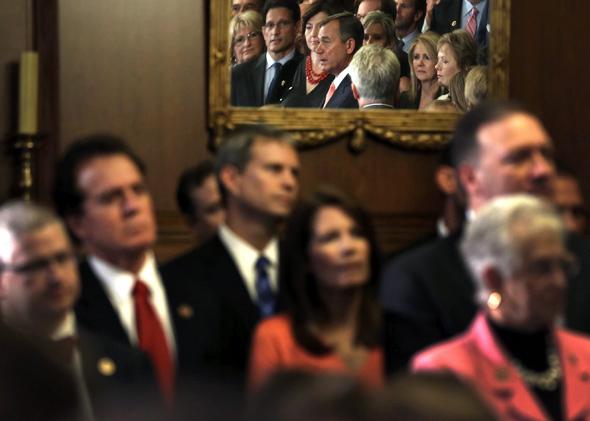Two hours before the 2013 government shutdown began, House Republicans leaked word of their final compromise. They would pass their final continuing resolution again, but with an important new feature. Now, they’d instruct the Senate to help them form a conference committee, a bicameral body that could hash out a deal.
Democrats hardly knew what to say. “You have lost it,” said Rep. Alcee Hastings at the House’s Rules Committee hearing. Senate Republicans had opposed “regular order,” as the normal way of operating is called, 18 times. Now Democrats were supposed to dragoon a half-dozen or so senators into a negotiation that would prevent a shutdown? Really? When the time between the hearing and the shutdown was shorter than an episode of Sherlock?
We wouldn’t find out. The new continuing resolution passed, and after midnight, House Republicans announced their conferees. Majority Leader Eric Cantor was on board, as was the (little-seen recently) Budget Chairman Paul Ryan and the chairmen of the Appropriations and Ways and Means committees. And there, at the end of the list, was Georgia Rep. Tom Graves.
That just added to the confusion. Wasn’t Graves the congressman who circulated legislation to fund the entire government but block Obamacare funding? Wasn’t he also the congressman who led on the backup plan to fund the government but delay Obamacare implementation by one year?
He was. Less memorably, he was the author of a letter, way back in April, asking Congress to get back to regular budgeting. “Continually governing by CR wastes money, creates massive inefficiencies, and can weaken our national security,” Graves wrote then. “This is exactly opposite of the good government initiatives and reforms each of us promised our constituents. Rather than negotiating yet another Continuing Resolution at the last minute, the Appropriations process should work as it was originally designed, with Appropriations bills passing the House and the Senate and being signed into law by the President, after robust debate, with a process for amendments.”
Whatever happened to this plan? The answer reveals plenty about the priorities of Republicans, the fears of Democrats, and the way Congress can no longer make a decision unless it’s in a room booby-trapped to explode in five minutes.
The problem with “regular order,” as pleasant as it sounded, was that any product it produced would disappoint conservatives. Budget reconciliation, where only 51 votes are required for approval, might be able to produce entitlement reforms, but it might produce additional taxes. Republicans just didn’t know what they might be asked to vote for at the end of the process, apart from, surely, the continuance of Obamacare. And that uncertainty gummed up the works. The same problem crippled the immigration reform push—after the Senate passed its comprehensive bill, Republicans worried that any immigration bill, when it got to conference, could be turned into “amnesty.”
The worry was compounded by unfamiliarity. Nearly one-half of the current Congress arrived after George W. Bush’s presidency ended. Just a fraction of the Congress remembers 1997, the last (pre-Lewinsky) year when the budget process finished up before the end of the fiscal year.
“In this body, it’s been so long since we had regular order, there’s a huge percentage of this membership that doesn’t remember, doesn’t understand, doesn’t have a clue how it’s supposed to work,” said Oklahoma Rep. Frank Lucas, chairman of the House Agriculture Committee, elected in 1994. “Ultimately, if you believe in regular order, just like any legislative procedure, you have to make sure that the minority is heard and the majority governs.”
On Monday, before the new House strategy was unveiled (and thus before he became a conferee), Graves was still keen on returning to a normal, noncrisis budgeting process. “I have no worries about regular order,” he said. “I think you’re seeing some regular order in play here. This has got to be the first time in a while that you’re seeing something go, House-Senate, House-Senate—it reminds me of that cartoon when I was a kid, Schoolhouse Rock. You remember that?”
But what would give the GOP a better shot at unraveling Obamacare? Surely that would be easier in a crisis than in regular order? “Clearly we need every moment, every opportunity we can get,” said Graves.
Accidentally or not, he presaged the party’s next move. On Monday night, when she rejected the GOP’s offer, Senate Budget Chairwoman Sen. Patty Murray said that her party opposed going to conference “with a gun to our head that says we’re shutting government down.”
Republicans, true to form, would like the right to carry that gun into the meetings. On Tuesday, their lonely conferees gathered for a six-minute press conference that was largely about optics. They sat at one side of the table—the absent Democrats were to be felt in the empty chairs at the opposite side. When a reporter asked why the conference process had been reborn, Paul Ryan explained that the GOP had more leverage now.
“We have a debt limit coming,” he said. “That debt limit is coming in about two weeks. Most budget agreements in the past have always involved debt limit increase. We think that’s the forcing mechanism, just like the Budget Control Act that President Obama signed before, or like Bowles-Simpson, or like Gramm-Rudman, or like the 1997 budget agreement. All those budget agreements came together because of debt limit increases.”
In other words, the regular budgeting process could continue. Republicans preferred that it continue—if we’re not dangerously overloaded with metaphors yet—on top of a ticking bomb. The old idea that was supposed to bring the budgeting process back to compromise had become another cudgel against the Democrats. And as Graves proved, it made for a great hashtag.
